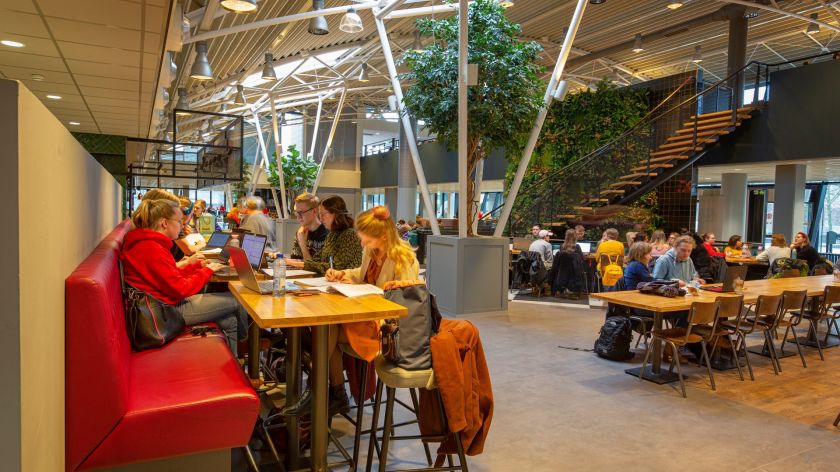‘Radboud University, stick to your ideals and switch to plant-based catering’
-
 De Refter. Foto: Vox
De Refter. Foto: Vox
OPINION - Students and scientists are pleading for a switch to plant-based catering on campus. Pieter Offermans, an employee with the Centre for Professional Legal Education, thinks that is a no-brainer that fits with Radboud University’s ambitions.
Last week was the start of the Plant-Based Universities campaign in the Netherlands. Students at various universities, including Radboud University, are calling on their institutions to switch to plant-based catering. Over 200 Dutch academics have already signed an open letter; there is also a petition for students and employees in Nijmegen.
According to Plant-based Universities, everybody who wants to will still be able to bring their home-made salami sandwiches to campus. The campaign is not focused on effecting change in individual students or employees, but rather in the University’s purchasing policies. They feel that the University should no longer invest in meat or dairy: two products with a hefty carbon footprint.
For years, I enjoyed large amounts of cheese and schnitzels, even on campus, so I can understand that Plant-Based Universities’ call to arms is a lot to swallow. But there is something to be said for making the switch to plant-based catering. In fact: if you look at Radboud University’s ambitions, the choice makes sense; I will explain why below.
Sustainability
According to statements by Radboud University, sustainability has “a prominent place in education, research and company policy”. In that sense, choosing for plant-based catering is a no-brainer. Meat and dairy are some of the leading causes of environmental issues, such as deforestation, soil erosion, water pollution, loss of biodiversity, and climate change.
I once compared the greenhouse gas emissions of a company lunch of forty cheese sandwiches with those of a plant-based alternative. As it turns out, the surplus emissions of the cheese sandwiches were on par with those of a blow dryer switched on for thirteen hours, or a lamp for four months. It’s no wonder that there is an increasing volume of studies and reports espousing the environmental benefits of plant-based food.
Health
The university wants to contribute to “a healthy, free world with equal opportunities for all”. Plant-based catering fits that goal as well; while meat and dairy do contain plenty of nutrients, they can also be unhealthy, especially at our current rate of consumption.
‘Eating plant-based foods at the university restaurant a few times per week can contribute to a healthy lifestyle’
For instance, eating processed red meat has been linked to an elevated risk of cancer, diabetes type 2, and heart- and vascular disease. All of that costs the taxpayer over 1 billion euros in extra healthcare costs. Recently, the Health council concluded that eating more grains, fruits, vegetables, nuts, and legumes is not just better for the environment, but also significantly lowers disease rates. Eating plant-based foods at the university restaurant a few times per week can contribute to a healthy lifestyle.
Animal rights
Radboud University’s sustainability manifesto emphasises animal rights. In the 17th century, philosopher and mathematician René Descartes posited that animals were mere machines, with no capacity for thought or feeling. Nowadays, there are still people who claim we can eat them guilt-free, as they supposedly barely experience stress or pain.
However, science has drawn some different conclusions since Decartes. Animals definitely experience pain and stress, and they’re a lot more clever than we think. For example: chickens have a basic understanding of numbers, as well as the ability to recall faces. One can posit whether our brief culinary enjoyment is worth locking up animals, cauterising their tails and horns, taking away their young, and killing them. By choosing plant-based catering, Radboud University would be choosing the most compassionate form of catering.
Make it easy
All signs point to plant-based catering as the way to go. And yet, Radboud University has no concrete, short-term plans to make the switch. For now, meatballs and roast beef win out over scientific insights and ideals. Of course, steps have been taken: the number of plant-based products on offer has increased over the past few years, and various campus spots now have coffee machines with oat milk. The plant-based hamburger in the Refter is even slightly cheaper than its meaty alternative. But the restaurants still have more meat- or cheese sandwiches than ones with hummus or smoked tofu; If you want a plant-based option at the company lunch, you will have to tell the caterer; taking the more sustainable, healthier, animal-friendly option takes more effort.
‘Radboud University could start by shifting norms from animal products to plant-based ones’
We can do better. Completely plant-based catering would be a logical step, but there are ambitious stepping stones for a smoother transition. For example, Radboud University could start by shifting norms from animal products to plant-based ones. In that case there is a wide assortment of tasty and healthy plant-based sandwiches and dishes, with a small number of meat and dairy dishes on standby. It goes without saying that the plant-based option should be the cheaper option (which should be doable, given that the same is true in Dutch supermarkets.) So, company lunches will switch to plant-based options by default; if someone wants something else, they can talk to the caterers beforehand. This will make it easier for students and employees to choose the sustainable, healthy, and animal-friendly option.
Getting used to it
The Plant-Based Universities campaign poses an important question to Radboud University: will you take science and your drive for a better world seriously? If you do, then make strides towards plant-based catering. Radboud University will not be alone: more and more other universities, as well as governments and companies are embracing similar initiatives. The climate, the animals, and our health cannot afford to wait. Of course, this step will take some getting used to. But as long as everything remains tasty, healthy, and affordable, we won’t want to go back.
Translated by Jasper Pesch



